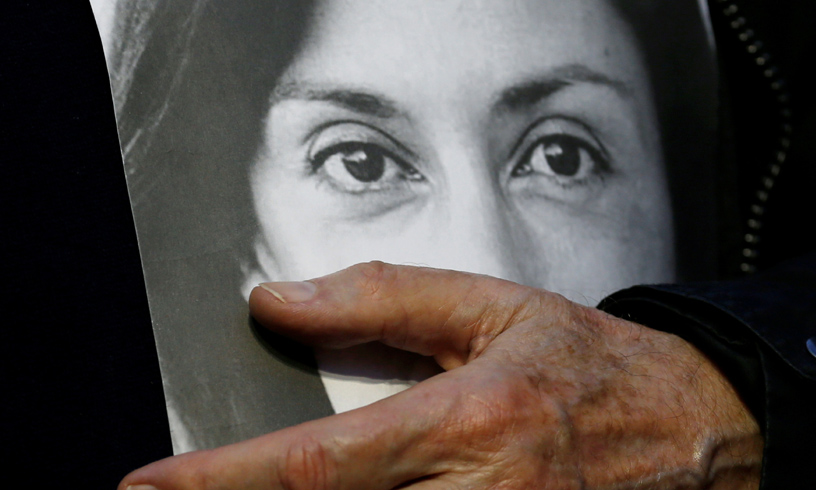It shouldn’t have taken a murder. Surely it didn’t need a car bomb in a quiet Maltese town. Daphne Caruana Galizia did not need to die for Europe and the rest of the world to take notice of media freedom’s precarious foundations. But to our shame, it did.
Five years ago today, Daphne was murdered by a car bomb that exploded when she was moments from her front door. But the car bomb was only the mechanism by which she was silenced. Daphne was murdered by the opaque but powerful forces that first encourage, before demanding and eventually forcing silence. But she was never rendered mute, even now.
In the years that have followed, Europe has wrestled both with her legacy – what her investigations revealed – as well as the legacy of her killing – what her murder revealed. In the aftermath of similar killings in Northern Ireland (Lyra McKee), Slovakia (Ján Kuciak and Martina Kušnírová), Greece (Giorgos Karaivaz) and the Netherlands (Peter R. de Vries), as well as increased attention on the use of strategic lawsuits against public participation (SLAPPs), Europe has been forced to address an uncomfortable reality: journalists are at risk all across the continent. And so, by extension, is European democracy.
This is the dark light that bathes Europe, a light emanating from the brutal collapse of the rule of law but also a light that can illuminate what is broken. In the five years that have passed since her death, Daphne’s family have had to fight for every inch to demand both justice for Daphne and accountability for Malta. Whether this was to demand a public inquiry, pressing for progress in the criminal investigation, and putting SLAPPs on the European agenda, the rage, sadness and fury has fuelled a reckoning that has helped bring forward a proposed European Commission directive on SLAPPs, a Europe-wide coalition of organisations fighting to upend this form of lawfare, as well as similar movements at a national level.
In the UK, spurred on by Russia’s unlawful invasion of Ukraine, the UK Government announced in July 2022 an anti-SLAPP mechanism that could limit how UK courts are abused to silence critical speech. As we wait to see what happens – especially after the change in Prime Minister and her cabinet – we hope we are at the threshold of something significant. It is important to remember that a number of the libel threats against Daphne were deployed with the aid of London-based legal expertise – SLAPPs cannot be confined within national borders.
But we must return to Malta to remind ourselves of the pitfalls. Recently announced reforms aimed at protecting journalism, including much-vaunted anti-SLAPP protections, have had to be hurriedly frozen by the Prime Minister after being widely derided as inadequate, both in terms of content, falling far short of the proposed EC Directive, and process. The Institute of Maltese Journalists (IGM) had threatened to step away from the Committee of Experts unless “meaningful” consultation takes place. This was echoed by both the International and European Federations of Journalists (IFJ and EFJ) who have joined the call for the legislation to be withdrawn, as reported in Maltese outlet, NewsBook: “no proposal on media legislative reform should be submitted to the parliament without a transparent public consultation. This is all the more crucial in a country where a state holds some form of responsibility for the killing of a journalist.” While appearing to be fuelled by a desire to be the first EU nation to bring forward national legislation responding to SLAPPs, a grimy sense of competitive haste has seemingly triumphed over a commitment to genuine and meaningful protections.
Today, vigils remembering Daphne’s legacy – her life, her writing, and her commitment to the public’s right to know – are taking place across Europe, in London, Valletta, Brussels and Edinburgh to name a few. But wherever we are, we must ensure that by remembering Daphne’s life, we are reminded of our commitment to protect journalists against vexatious legal threats, physical attacks and every act that isolates, demonises or targets them.
Progress is slow and halting and will not proceed from one point to the next without obstruction – Malta’s current reform process is testament to that – however, the greatest way we can honour Daphne is by moving with purpose to ensure what happened to her cannot happen to another journalist. The dark light has illuminated what needs to change and the urgency with which it must change. It should not have taken the murder of a journalist for this to happen and we must not forget the darkness that sparked this push for greater protections, a darkness that robbed a family of the private space in which to mourn, but we must follow where the light leads. For in Daphne’s words, “There are crooks everywhere you look. The situation is desperate.






